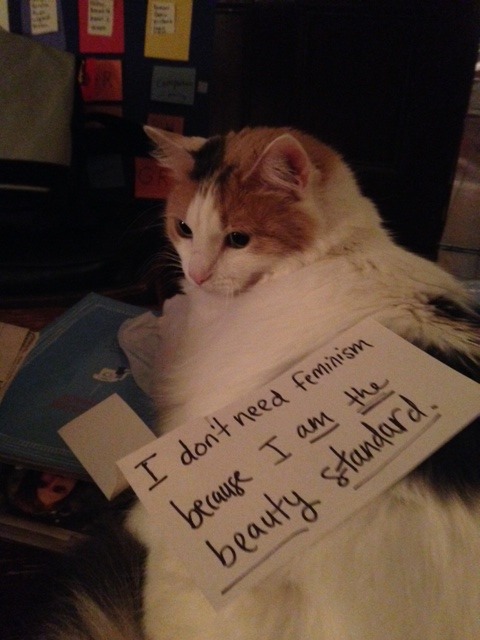First of all, a brief history.
So this happened:


Which led to this.
Then someone did this and made my day:

Meanwhile, this girl:

grew up to do this:
Naturally, someone responded with this:
And it goes on, with stuff like this, this, and more.
So now that you're up to speed, I'll tell you why as a feminist, all this Women Against Feminism (WAF) business really warms my heart.
First of all, let's take the general grouse everybody - WAFs, chauvinists, orthodox people and men at the receiving end of radical feminism - have against the F word: feminists, they say, in protesting the injustice against women often swing to the other extreme and get unfair to men.
WHAT? Feminists aren't always fair? That... is... so....;
true.
Yeah, there are men-haters, there are women who either in their zeal for service to a true cause, or meanness of their heart, or as a vent against the terrible life they've had, or maybe because they were dropped in a vat of man-hating potion as babies, err too much in the other direction.
At least I believe there are. I live in a country where a lot of women have never heard of feminism, and the idea of equality between the sexes would be alien to a lot of men as well as women. So the discourse on feminism that I have been exposed to has been substantial, based on some unfortunate realities. I haven't come across a feminist who wants to go about neutering all the men in the vicinity just for the kicks.
So this happened:


Which led to this.
Then someone did this and made my day:

Meanwhile, this girl:

grew up to do this:
Naturally, someone responded with this:
And it goes on, with stuff like this, this, and more.
So now that you're up to speed, I'll tell you why as a feminist, all this Women Against Feminism (WAF) business really warms my heart.
First of all, let's take the general grouse everybody - WAFs, chauvinists, orthodox people and men at the receiving end of radical feminism - have against the F word: feminists, they say, in protesting the injustice against women often swing to the other extreme and get unfair to men.
WHAT? Feminists aren't always fair? That... is... so....;
true.
Yeah, there are men-haters, there are women who either in their zeal for service to a true cause, or meanness of their heart, or as a vent against the terrible life they've had, or maybe because they were dropped in a vat of man-hating potion as babies, err too much in the other direction.
 |
| Basically this guy with boobs. Image courtesy: www.comicvine.com |
At least I believe there are. I live in a country where a lot of women have never heard of feminism, and the idea of equality between the sexes would be alien to a lot of men as well as women. So the discourse on feminism that I have been exposed to has been substantial, based on some unfortunate realities. I haven't come across a feminist who wants to go about neutering all the men in the vicinity just for the kicks.
 |
| I'm making a POINT, people! |
But my heart goes out to the men who have suffered blatant prejudice, hatred and abuse just because of their gender. To them I say, "Welcome to the club. We know how it feels."
No, I am not trying to justify the wrongs of the radical feminists on the basis of centuries and centuries of injustice meted out to women. The unfortunate fact is that every social and political movement in history tends to overcompensate the injustices it sets out to fight with equal and opposite injustice. In A Tale Of Two Cities, Charles Dickens views the French Revolution through the intimate lens of a family that finds itself on the wrong side of the class divide both before and after the oppressed classes rise in arms against the aristocrats. Without taking away from the pain and struggle that the revolutionaries had to go through to steel themselves for such a massive uprising, the novel draws focus on how innocent lives get crushed in the battle between the classes. And this was a century and a half before 'collateral damage' became part of popular vocabulary.
In India, caste and religion today have become political identities vying for the biggest piece of the power pie, while the people in whose name the wars are fought continue living under conditions unimaginable to anyone who can read a calendar.
The examples are endless, although none of that justifies that someone calling themselves a feminist should expend their time and energy to add more misery to the world. That is not what feminism set out to do.
The story of social and political movements however, does not end there. The pendulum of social justice keeps swinging until we arrive at some semblance of balance and equilibrium. In Indian politics, this should mean a Utopian future where caste, religion and language no longer define who you are and what is possible for you. When that happens, and I'm one of those optimistic fools who believe that such things can happen in the world, caste-based political parties, reservations, honor killings and stupid politicians will become redundant. It might be a very boring future, because comedians may then have to make jokes about food, but then I'm confident we'll have invented new social evils to keep ourselves amused.
For feminism, the idea of Utopia is a world where your gender does not define what is possible for you. Sure, men will still not be able to have babies, and women will still bleed every month, but beyond the actual biological differences, the forced differences between genders, based on qualities perceived to be feminine or masculine owing to centuries of conditioning, those would be gone. Women will fix their own cars and men will wash their own cups. And feminism will become a meaningless term.
The reason I think WAF is a good thing is simply that I see it as a sign of such a future becoming a reality. If you read through the reasons some of those women are citing for not needing feminism, you'll see that feminism has done its job for them. One woman - I couldn't find that image at the time of posting this - wrote a lengthy sermon on how she treats her sons and daughters equally. The lady in the video above argues that her grouse isn't against the dictionary definition of feminism, but how it actually manifests in the lives of those around her.
This is all very good, for three main reasons:
- Like every important social movement, feminism needs to be closely observed, critiqued and held accountable for its actions. Denying this right to anyone, however enlightened or ignorant they might be, goes against the grain of feminism. Also, if some women do not want to associate with a certain label, it is their choice and they are under no obligation to educate themselves on the subject. If they change their mind however, we'll always be right here, quietly burning our bras.
- At the very least, the WAF movement has sparked off a debate on feminism as it stands today. It is a good opportunity to redraw focus on some of the real issues that make feminism a necessity. Also, if there is the slightest truth in any of those accusations, the feminists may want to take a step back to reassess their priorities and perhaps distance themselves from supporters who may be harming the cause by citing feminism in the wrong context.
- But most importantly, the very fact that there are women, however few, however hated by the Internet, who really, sincerely think they don't need feminism, who feel they have everything they want in life and don't need to fight for anything, who take their voting rights for granted, who have never known a world where their intellectual capabilities could be judged on the basis of the kind of genitals they were born with... then hurray! Mission accomplished. May I live to see a world where feminism becomes a joke, where its real function will have been fulfilled long ago.
As of now, we live in interesting times. There are more and more male feminists - I know some of them right here in India. There are women standing up for men, and since they have the platform to do so, I take it that these women have received the education, financial freedom and intellectual choice it takes to upload a YouTube video. This may be true only for a tiny number of women in very few countries, but it is happening. The pendulum is swinging back, and it is slowing down near the middle.